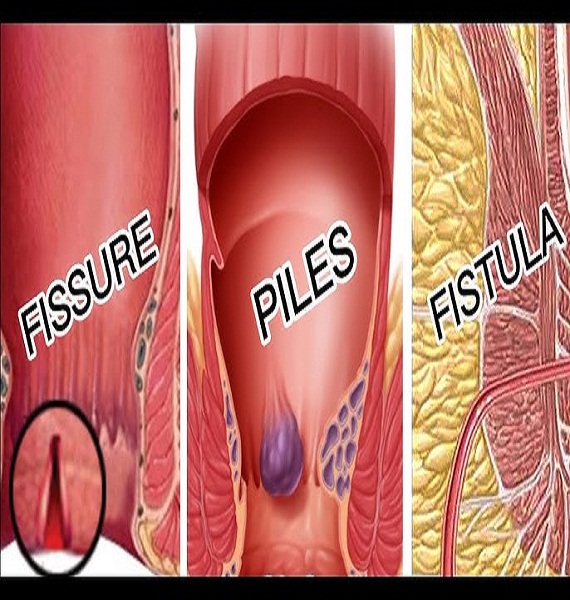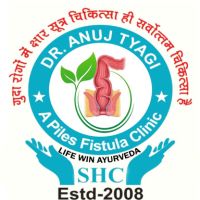
Difference Between Piles and Fissure and Fistula
Want to Know difference between piles and fissure and fistula? - Piles, fissures, and fistulas are three common anorectal conditions that can cause significant discomfort and pain. While they share some similarities, they are distinct in their causes, symptoms, and treatments.
Understanding the differences between these conditions is crucial for accurate diagnosis and effective treatment.
At Piles Fistula Clinic in Ghaziabad, we specialize in the diagnosis and treatment of piles, fissures, and fistulas, offering comprehensive care to help you manage and overcome these conditions.
In this blog, we'll delve into the specifics of each condition, explore the key differences between them, and provide insights into the most effective treatment options available.
What Are Piles, Fissures, and Fistulas?
Before diving into the difference between piles fissure and fistula, let's first define what piles, fissures, and fistulas are.
1. Piles (Hemorrhoids)
Piles, also known as hemorrhoids, are swollen and inflamed veins in the rectum and anus.
They can develop inside the rectum (internal hemorrhoids) or under the skin around the anus (external hemorrhoids).
Piles are common and can affect people of all ages, though they are more prevalent in adults.
Causes of Piles
- Chronic constipation or diarrhea
- Straining during bowel movements
- Prolonged sitting, especially on the toilet
- Pregnancy (due to increased pressure on the pelvic blood vessels)
- Obesity
- Low-fiber diet
Symptoms of Piles
- Bleeding during bowel movements (bright red blood)
- Itching or irritation in the anal area
- Pain or discomfort around the anus
- Swelling or a lump near the anus
- Mucus discharge after passing a stool
2. Fissures (Anal Fissures)
Anal fissures are small tears or cuts in the lining of the anus. These tears can cause pain and bleeding during and after bowel movements.
Fissures are often mistaken for hemorrhoids, but they are a separate condition with distinct causes and symptoms.
Causes of Fissures
- Passing large or hard stools
- Chronic constipation or diarrhea
- Straining during bowel movements
- Anal trauma (such as during childbirth)
- Inflammatory bowel diseases (e.g., Crohn's disease)
Symptoms of Fissures
- Sharp pain during bowel movements
- Bright red blood on the stool or toilet paper
- A visible crack or tear in the skin around the anus
- A small lump or skin tag near the fissure
- Itching or irritation around the anus
3. Fistulas (Anal Fistulas)
Anal fistulas are abnormal connections or tunnels between the inside of the anus or rectum and the skin surrounding the anus.
They are usually the result of an infection that has developed into an abscess, which then drains through the fistula. Fistulas can be painful and often require surgical treatment.
Causes of Fistulas
- Infections in the anal glands
- Previous abscesses in the rectal area
- Crohn's disease
- Tuberculosis
- Radiation therapy
- Trauma or injury to the anal area
Symptoms of Fistulas
- Persistent pain and swelling around the anus
- Discharge of pus or blood from an opening near the anus
- Irritation or skin inflammation around the anal opening
- Fever (in case of infection)
- Difficulty with bowel movements
Piles vs. Fissure vs. Fistula: Understanding the Differences
Now that we've defined each condition, let's explore the differences between piles, fissures, and fistulas.
1. Location and Nature of the Condition
- Piles: Piles are swollen veins in the rectum or anus. They are primarily a vascular issue, similar to varicose veins.
- Fissures: Fissures are small tears in the skin of the anus, resulting from trauma or excessive strain during bowel movements.
- Fistulas: Fistulas are abnormal tunnels connecting the inside of the anus or rectum to the skin outside. They often develop due to an infection that creates an abscess.
2. Symptoms and Presentation
- Piles: Piles often cause painless bleeding during bowel movements, itching, and discomfort. External piles can be painful if thrombosed.
- Fissures: Fissures cause sharp, intense pain during and after bowel movements, accompanied by bleeding. The pain is often described as a burning or tearing sensation.
- Fistulas: Fistulas result in persistent pain, swelling, and discharge of pus or blood. They can also cause recurrent abscesses and fevers if infected.
3. Causes and Risk Factors
- Piles: Piles are primarily caused by increased pressure on the rectal veins due to factors like constipation, pregnancy, and obesity.
- Fissures: Fissures are typically caused by trauma to the anal canal, such as passing large or hard stools, or chronic diarrhea.
- Fistulas: Fistulas are usually the result of an infection or abscess that creates an abnormal tunnel between the rectum and the skin.
4. Treatment Options
- Piles: Treatment for piles includes dietary changes, over-the-counter creams, and in some cases, surgical interventions like hemorrhoidectomy or rubber band ligation.
- Fissures: Treatment for fissures includes stool softeners, topical anesthetics, and in severe cases, surgical procedures like lateral internal sphincterotomy.
- Fistulas: Fistulas often require surgical treatment, such as fistulotomy or seton placement, to drain the abscess and close the abnormal connection.
Piles Fistula Clinic: Comprehensive Care for Anorectal Conditions
At Piles Clinic in Ghaziabad, we specialize in diagnosing and treating piles, fissures, and fistulas, providing personalized care tailored to each patient's needs.
Our team of experienced specialists is dedicated to helping you find relief from these painful conditions through a combination of medical and surgical treatments.
Diagnosis and Evaluation
The first step in treating any anorectal condition is an accurate diagnosis. At Fissure Clinic in Ghaziabad, we conduct thorough evaluations to determine the nature and severity of your condition.
This may include a physical examination, anoscopy, or imaging studies like an MRI or ultrasound to assess the extent of the problem.
Customized Treatment Plans
Once a diagnosis is made, our team will develop a customized treatment plan tailored to your specific condition. Whether you're dealing with piles, fissures, or fistulas, we offer a range of treatment options designed to provide relief and promote healing.
Treatment for Piles
- Lifestyle Modifications: Increasing fiber intake, staying hydrated, and avoiding prolonged sitting can help prevent and manage piles.
- Medications: Over-the-counter creams, suppositories, and oral pain relievers can reduce symptoms like itching and swelling.
- Minimally Invasive Procedures: For more severe cases, we offer procedures like rubber band ligation, sclerotherapy, and infrared coagulation to remove or shrink hemorrhoids.
- Surgical Interventions: In cases where other treatments fail, surgical options like hemorrhoidectomy or stapled hemorrhoidopexy may be recommended.
Treatment for Fissures
- Topical Treatments: Applying topical anesthetics and vasodilators can help relax the anal sphincter and promote healing.
- Stool Softeners: Softening the stool can reduce strain during bowel movements and prevent further damage to the fissure.
- Botox Injections: In some cases, Botox injections may be used to temporarily paralyze the anal sphincter and allow the fissure to heal.
- Surgery: For chronic or non-healing fissures, a lateral internal sphincterotomy may be performed to reduce sphincter pressure and promote healing.
Treatment for Fistulas
- Drainage and Antibiotics: In cases of infection, the first step is often to drain the abscess and treat the infection with antibiotics.
- Fistulotomy: This surgical procedure involves cutting open the fistula to allow it to heal from the inside out.
- Seton Placement: A seton is a surgical thread that is placed in the fistula to keep it open and allow it to drain, reducing the risk of further abscess formation.
- Advancement Flap Procedure: In some cases, the fistula opening inside the rectum is covered with a flap of healthy tissue to promote healing.
Post-Treatment Care and Support
At Piles Fistula Clinic, we believe that recovery doesn't end with treatment. We provide comprehensive post-treatment care and support to ensure that you achieve the best possible outcome.
Our team will work with you to develop a maintenance plan that includes lifestyle modifications, dietary advice, and follow-up visits to monitor your progress.
Get Expert Care at Piles Fissure Fistula Clinic
If you're struggling with the pain and discomfort of piles, fissures, or fistulas, don't wait to seek help. At Piles Fistula and Fissure Clinic, our experienced specialists are here to provide you with the expert care you need to find relief and regain your quality of life. We offer a range of advanced treatment options tailored to your specific condition, ensuring that you receive the best possible care.
Contact us today to schedule a consultation and take the first step toward a pain-free life. Whether you need treatment for piles, fissures, or fistulas, we're here to help you every step of the way.
